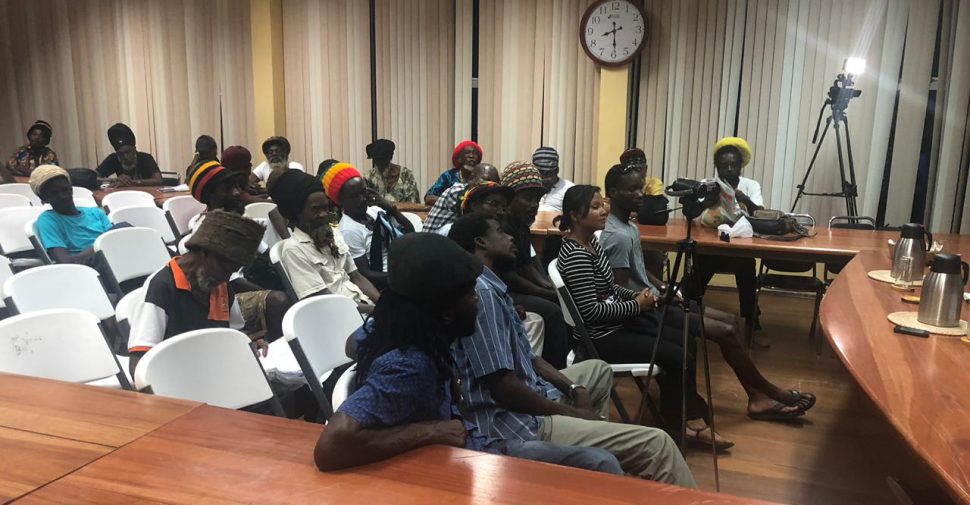The criminalisation of marijuana is a violation of Rastafarian human rights, activist Ras Kali told a forum on marijuana decriminalisation held by the International Decade for People of African Descent Assembly-Guyana (IDPADA-G) Friday evening.
The discussion forum was held at the Guyana Racquet Centre on Woolford Avenue and its attendance was dominated by members of the Rastafarian community, who have been very vocal about the decriminalisation and legalisation of the widely used plant.
Opening the floor for discussion, IDPADA-G Chairman Vincent Alexander said that the forum was held after the issue of marijuana legalisation was raised at their last annual meeting.
“Last Sunday we had our annual meeting and some of the brethren and sisters attended and in that forum the issue of the legalisation of ganja was raised and so we felt that since we are going to be facilitating the work of our communities and advancing their interest, and since Parliament is about to meet shortly, that we should facilitate a forum like this to advance discussion in relation to the legalisation of the herb,” Alexander told the gathering.
In August, Cabinet approved the removal of custodial sentences for the possession of small amounts of marijuana and it was decided that the necessary amendments to existing legislation would be made after the National Assembly returns from recess this month.
Friday’s discussion was led by several panellists, including representatives from the Rastafarian community— Esther Gittens, Ras Kali, Ras Leon Saul, Ras Ruben, and Dr Dawn Stewart.
Ras Kali emphasised that the forum is equally important for the Rastafarian and African communities, as all over the world the majority of those who are incarcerated for marijuana-related crimes are of African descent.
“Right now our main thing is that we are being discriminated against. First of all, the Universal Declaration of Human Rights, Article 18 states that everyone has the right to freedom of thought, conscience and religion; this right includes freedom to change his religion or belief, and freedom, either alone or in community with others and in public or private, to manifest his religion or belief in teaching, practice, worship and observance… so that’s our first right being discriminated,” Ras Kali explained, while noting that the Constitution of Guyana also reverberates the same message. He said that their rights are being discriminated against in all forms.
He also explained that while it is often believed that the Rastafarian community consumes the herb solely, it is untrue since the use of marijuana has become widespread in our society and is being used by people of all ethnicities, ages and other distinctions.
Ras Kali also made strong references to the economic value of not only legalising the plant but supporting its industry.
“People are doing big business with marijuana and our government [is] putting people in jail for small amounts. Ganja is business, big business… Jamaica is sending its first ganja oil [extract] to Canada and making money and here we have unemployment and crime and we are saying we don’t deal with it,” he asserted, while referencing the $20 billion in marijuana that was destroyed by the Guyana Police Force last year.
He said that while the country continues to borrow money from other countries and are always complaining about the lack of money, the marijuana industry and its by-products can be a very profitable and economic venture.
“We might be looking at oil but we have the land and we have control over that. Marijuana is not just something to smoke, it has serious economic benefit but people always want to focus on Rasta want to smoke all the time,” he added.
Gittens also took the opportunity to elucidate and emphasise that not all Rastafarians smoke the herb, but use it in many different ways.
“…When we use the herb is because we know the goodness for us. Not to say that we are promoting smoking. I would say smoking is dangerous for your health and there’s no going against that. In fact, you get the smallest use or value when you smoke it. But because [of] the prohibition we are not able to get our fresh herbs. You have to have it far, ducking and hiding it so you can’t have it fresh to use,” she said.
Gittens also highlighted the adverse effects on families that the draconian laws have when people are arrested and jailed for having small amounts of the plant in their possession.
“…When you take away the father, as most times happen, the mother and children are left unprotected and most Rastafari would have large families. So when you lock up a Rasta man for a piece of weed, know you depriving the family [and] many domestic situation arise because of the absence of parents and from the time the lawyers hear its marijuana you have to start thinking about retaining a lawyer from $100,000 and for many years it has been so and so it then affects the family financially,” Gittens explained.
Gittens also pointed out that the wanton destruction of thousands of marijuana plants every year does not fall in line with the country’s Green State Development Strategy and not only are important economic avenues lost when the plants are destroyed, but also important medicinal value.
“Decriminalising will enable more people to drink and cook it, bake it and use it the way we really should be using it. If we are talking sustainable development and Green State Development and equal rights… we need to take seriously into consideration decriminalising marijuana, at least in small amounts as a starter,” she added.









